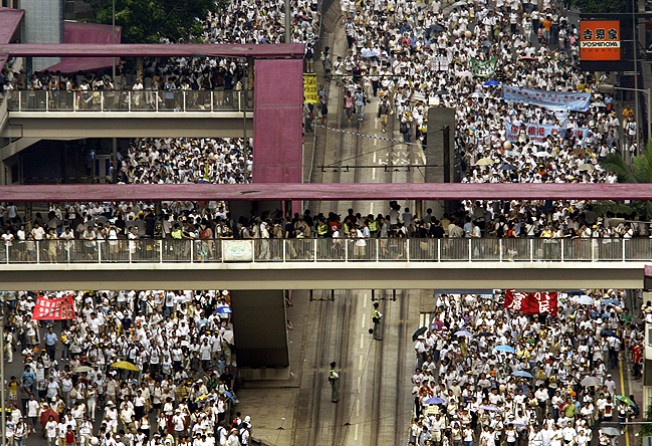
Survey reveals soaring levels of public dissatisfaction with Hong Kong's government
Research by independent Hong Kong Transition Project indicates high levels of discontent over governance and the prospects for constitutional reform

Almost two thirds of permanent residents are dissatisfied with the performance of the SAR government under Chief Executive Leung Chun-ying, only the second time a majority has expressed discontent, according to a new survey. The first was in 2004, when hundreds of thousands took to the streets in protest.
Those surveyed were particularly unhappy with the Chief Executive over the past year: “Dissatisfaction with Leung’s performance has risen from 53 per cent dissatisfied in 2013 to 65 per cent dissatisfied in 2014,” the report said.
Hongkongers were also unhappy with the performance of the central government in Beijing, with a majority saying they think it could do better for the first time since 2004.
When it comes to Beijing’s governance over Hong Kong, 56 per cent of respondents said they were dissatisfied, on a par with levels in 2004.
The findings come from the Hong Kong Transition Project, an independent research group that has been surveying peoples’ views on political development and constitutional reform since 1991 as part of study of the transition from British colonial subjects to SAR citizens.
The Project’s report, released on Wednesday, Constitutional Reform: Consultation looms as Hong Kong Consults, distinguishes between the views of different age groups and finds younger people are more discontented than their elders.
More than three out of four under the age of 40 are dissatisfied with the government’s performance, with a third of those in their 20s and 30s “very dissatisfied”. Ninety per cent of students said they were dissatisfied, with the same number in the under-20 age group.

Frustration is not confined to the young, however, with three out of four professionals who responded indicating dissatisfaction and two thirds of managers, administrators and clerks concurring.
Three-quarters of graduates felt the government could do better and among workers in the public sector 61 per cent were not satisfied.
With the period of public consultation on constitutional reform due to end on May 3 very few respondents in the under-30 age group “believe that C Y Leung will implement a fair system of nomination and election for the Chief Executive in 2017”, according to the report.
Fewer than one in ten said they had even some belief that he would. Taking the survey as a whole, 72 per cent indicated they had “none or very little belief that the Chief Executive will implement a fair system”. The report points out that: “the consultation so far has done nothing to reduce distrust in the Chief Executive’s intentions.”
In contrast, support for direct Chief Executive elections is at the highest level ever recorded by the survey, with 89 per cent in favour of the proposal and just 6 per cent in opposition. The number of those who said they “strongly support” direct elections rose to 45 per cent. The young were most adamant, with 95 per cent of under-40s supporting direct CE elections.
Support for direct elections for all members of Legco is at 85 per cent, matching last year’s record high, but 40 per cent of survey respondents said they “strongly support” the notion a 7 per cent increase. Ninety per cent of under-40s also support Legco direct elections.
The survey also indicates that protesting as a means of expressing concern has risen significantly over the lifetime of the SAR. Just 5 per cent of those who responded had protested in the period between 1996 and 2003 but that number had trebled between 2003 and this year. A finding that suggests people in Hong Kong feel they must protest in order to achieve any political change.